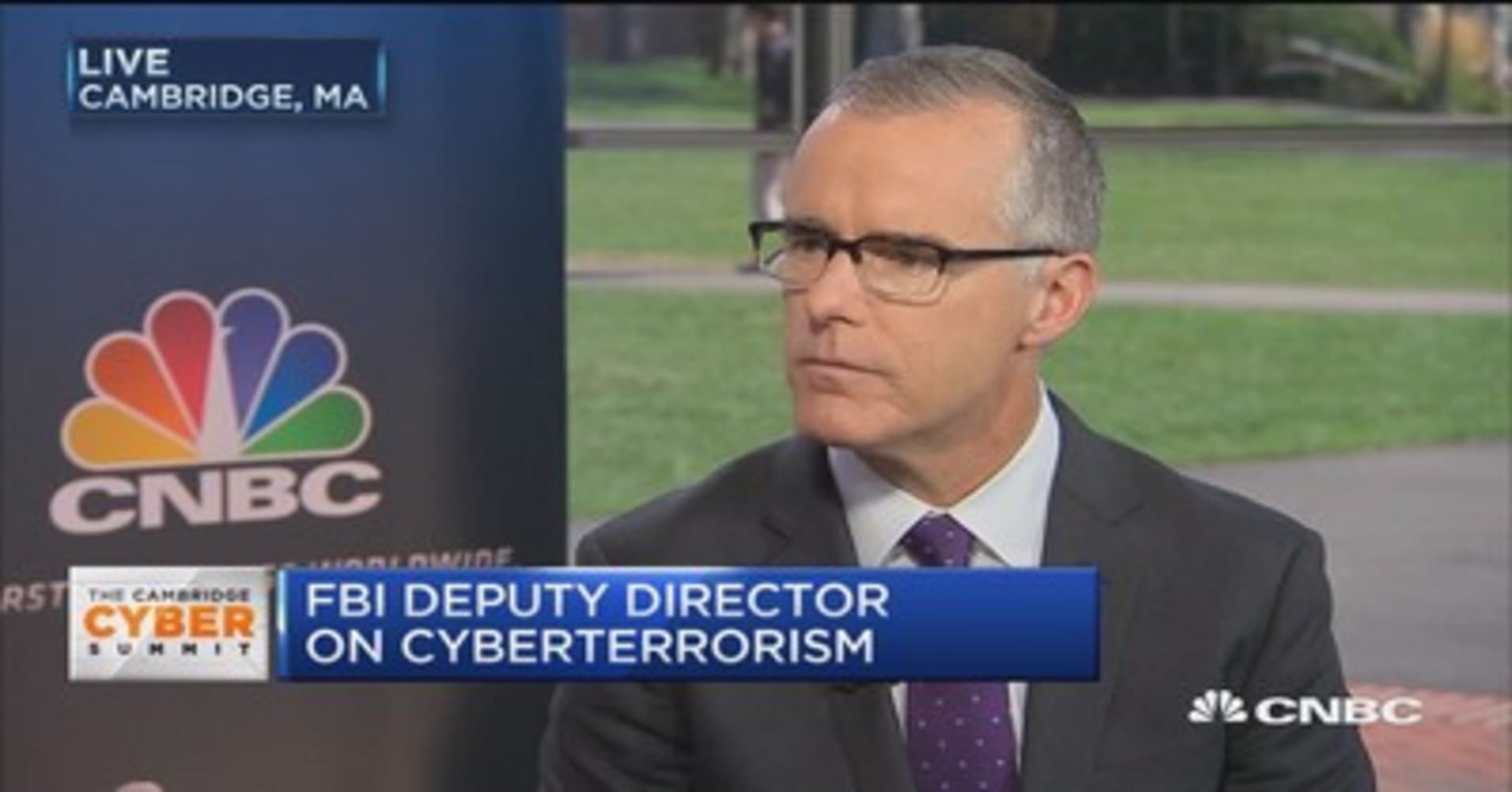Two weeks ago North Korea conducted a failed missile test that came on the heels of an earlier test in March where four medium range ballistic missiles were fired in a salvo. Those missiles traveled to their maximum range of 620 miles with some falling in the waters belonging to Japan’s exclusive economic zone.
North Korea has previously test-fired missiles near Sinpo, where it has a submarine base.
A KN-11 submarine launched missile was successfully launched from waters off Sinpo last August that traveled 310 miles into the Sea of Japan.
In February, North Korea successfully tested a land-based version of the KN-11 that also traveled the same distance.
General John Hyten, the commander of U.S. Strategic Command, told a Congressional panel Tuesday that the February launch marked a significant advancement for North Korea because it was its first successful solid-fueled missile fired from a mobile launcher.
Hyten labeled the February launch of the KN-11 missile as “a major advancement” by North Korea because it was “a new solid medium range ballistic missile off a new transporter erector launcher.”
And Hyten said North Korea showed off pictures “for the entire world to see out of a place we’d never seen before that showed a new technology. A new North Korean capability to employ a very challenging technology for us.”
He explained that liquid-fueled missiles can be unstable and take a long time to fuel and set-up. But “a solid (fueled) rocket can be rolled out and launched at a moment’s notice.”
Hyten added that America’s early missile program was based on liquid fueled rockets that could be unstable and dangerous but “a solid is a much better solution. So all of our inventory now is solids.” More here from ABC.
*** How badly did Obama’s sequestration affect the United State’s ability to deter or intercept an ICBM or MRBM or miniature nuclear weapon launched by North Korea? I am betting on some hope of electronic warfare or U.S. cyber intrusion that would go through China.
The Pentagon has spent more than $40 billion on the Ground-based Midcourse Defense system — GMD for short. It’s designed specifically to thwart a nuclear strike by North Korea or Iran. Yet there are grave doubts about whether it’s up to the task.
Here is a look at the system’s origins, how it’s supposed to work and the technical problems that have bedeviled it.
What exactly is GMD supposed to do?
It’s designed to defend the United States against a “limited” nuclear attack. That means a strike with a handful of missiles, as opposed to a massive assault of the kind that Russia or China could launch. The United States relies on deterrence — the threat of overwhelming retaliation — to prevent Russia or China from ever unleashing missiles against us. In the case of North Korea or Iran, we would rely on GMD to knock incoming warheads out of the sky. More here.
***
The THAAD system is in place now as a defensive measure. The Chinese are very concerned on this system as they do not know all the features or abilities of the THAAD.
General Hyten, Commander of STRATCOM presented chilling testimony on April 4th explaining the condition of offensive and defensive systems with particular emphasis on the nuclear TRIAD platform which is slowly aging out, meaning all too soon, the submarines are no longer able to dive.
So, are there other options? Yes, but they were not revealed in open session testimony and when General Hyten tells us that every action the United States takes to maintain the edge militarily, our adversaries especially Russia takes twice as many.
What about SDI as pursued decades ago by President Reagan? Well, this may help that discussion, but sadly we are not there yet.
The Multi-Object Kill Vehicle can simultaneously destroy ICBMs and decoys with a single interceptor
The Pentagon’s Missile Defense Agency is in the early phases of engineering a next-generation “Star Wars”-type technology able to knock multiple incoming enemy targets out of space with a single interceptor, officials said.
The new system, called Multi-Object Kill Vehicle, or MOKV, is designed to release from a Ground Based Interceptor and destroy approaching Inter Continental Ballistic Missiles, or ICBMs — and also take out decoys traveling alongside the incoming missile threat.
“We will develop and test, by 2017, MOKV command and control strategies in both digital and hardware-in-the-loop venues that will prove we can manage the engagements of many kill vehicles on many targets from a single interceptor. We will also invest in the communication architectures and guidance technology that support this game-changing approach,” a spokesman for the Missile Defense Agency, told Scout Warrior a few months ago.
Decoys or countermeasures are missile-like structures, objects or technologies designed to throw off or confuse the targeting and guidance systems of an approaching interceptor in order to increase the probability that the actual missile can travel through to its target.
If the seeker or guidance systems of a “kill vehicle” technology on a Ground Base Interceptor, or GBI, cannot discern an actual nuclear-armed ICBM from a decoy – the dangerous missile is more likely to pass through and avoid being destroyed. MOKV is being developed to address this threat scenario.
The Missile Defense Agency has awarded MOKV development deals to Boeing, Lockheed and Raytheon as part of a risk-reduction phase able to move the technology forward, Lehner said.
Steve Nicholls, Director of Advanced Air & Missile Defense Systems for Raytheon, told Scout Warrior the MOKV is being developed to provide the MDA with “a key capability for its Ballistic Missile Defense System – to discriminate lethal objects from countermeasures and debris. The kill vehicle, launched from the ground-based interceptor extends the ground-based discrimination capability with onboard sensors and processing to ensure the real threat is eliminated.”
MOKV could well be described as a new technological step in the ongoing maturation of what was originally conceived of in the Reagan era as “Star Wars” – the idea of using an interceptor missile to knock out or destroy an incoming enemy nuclear missile in space. This concept was originally greeted with skepticism and hesitation as something that was not technologically feasible.
Not only has this technology come to fruition in many respects, but the capability continues to evolve with systems like MOKV. MOKV, to begin formal product development by 2022, is being engineered with a host of innovations to include new sensors, signal processors, communications technologies and robotic manufacturing automation for high-rate tactical weapons systems, Nicholls explained.
The trajectory of an enemy ICBM includes an initial “boost” phase where it launches from the surface up into space, a “midcourse” phase where it travels in space above the earth’s atmosphere and a “terminal” phase wherein it re-enters the earth’s atmosphere and descends to its target. MOKV is engineered to destroy threats in the “midcourse” phase while the missile is traveling through space.
An ability to destroy decoys as well as actual ICBMs is increasingly vital in today’s fast-changing technological landscape because potential adversaries continue to develop more sophisticated missiles, countermeasures and decoy systems designed to make it much harder for interceptor missile to distinguish a decoy from an actual missile.
As a result, a single intercept able to destroy multiple targets massively increases the likelihood that the incoming ICBM threat will actually be destroyed more quickly without needing to fire another Ground Based Interceptor.
Raytheon describes its developmental approach as one that hinges upon what’s called “open-architecture,” a strategy designed to engineer systems with the ability to easily embrace and integrate new technologies as they emerge. This strategy will allow the MOKV platform to better adjust to fast-changing threats, Nicholls said.
The MDA development plan includes the current concept definition phase, followed by risk reduction and proof of concept phases leading to a full development program, notionally beginning in fiscal year 2022, Nicholls explained.
“This highly advanced and highly technical kill vehicle takes a true dedication of time and expertise to properly mature. It is essential to leverage advancements from other members of the Raytheon kill vehicle family, including the Redesigned Kill Vehicle,” Nicholls said.
While the initial development of MOKV is aimed at configuring the “kill vehicle” for a GBI, there is early thinking about integrating the technology onto a Standard Missile-3, or SM-3, an interceptor missile also able to knock incoming ICBMs out of space.The SM-3 is also an exo-atmopheric “kill vehicle,” meaning it can destroy short and intermediate range incoming targets; its “kill vehilce” has no explosives but rather uses kinetic energy to collide with and obliterate its target. The resulting impact is the equivalent to a 10-ton truck traveling at 600 mph, Raytheon statements said.
“Ultimately, these Multi-Object Kill Vehicles will revolutionize our missile defense architecture, substantially reducing the interceptor inventory required to defeat an evolving and more capable threat to the homeland,” an MDA official said.
***
So what about North Korea?
North Korea’s Most Important Submarine Base
North Korea’s submarine force is one of the more capable wings of its generally decrepit military. The current force’s strength lies mostly in its numbers — North Korea possesses roughly 70 submarines in all, roughly 40 of which are its newest Shark-class vessels. (Though still dangerous to its adversaries, even the Shark-class reflects pretty dated technology.) With that number, the DPRK can and does crowd its coasts with torpedo-armed or mine-laying submarines, establishing a respectable anti-surface capability near its waters. Though most of its submarine force is old, loud, or both, still North Korea tinkers on, boldly determined to achieve a reliable sea-based nuclear deterrent.
North Korean leader Kim Jong-un (front) stands on the conning tower of a submarine during his inspection of the Korean People’s Army (KPA) Naval Unit 167 in this undated photo released by North Korea’s Korean Central News Agency (KCNA) on June 16, 2014.
Image Credit: KCNA via Reuters
To this effect, the DPRK is building the new Gorae-class submarine (or Sinpo-class) and testing Submarine-Launched Ballistic Missiles (SLBMs) accordingly. Remarkably, most of this activity and materiel are headquartered within a few kilometers of each other in the city of Sinpo and the nearby Mayang-Do Naval Base. Shipyards for the new Gorae-class, SLBM research and development facilities, many or most of the DPRK’s east coast submarines, and the only known ground-based launch platforms for SLBM tests — all are located along the same 35 square kilometer stretch of the North Korean coast. A well-coordinated first strike on this facility would hamstring the North’s submarine fleet, its submarine building capacity, and its hopes of a credible naval nuclear deterrent all in one go.
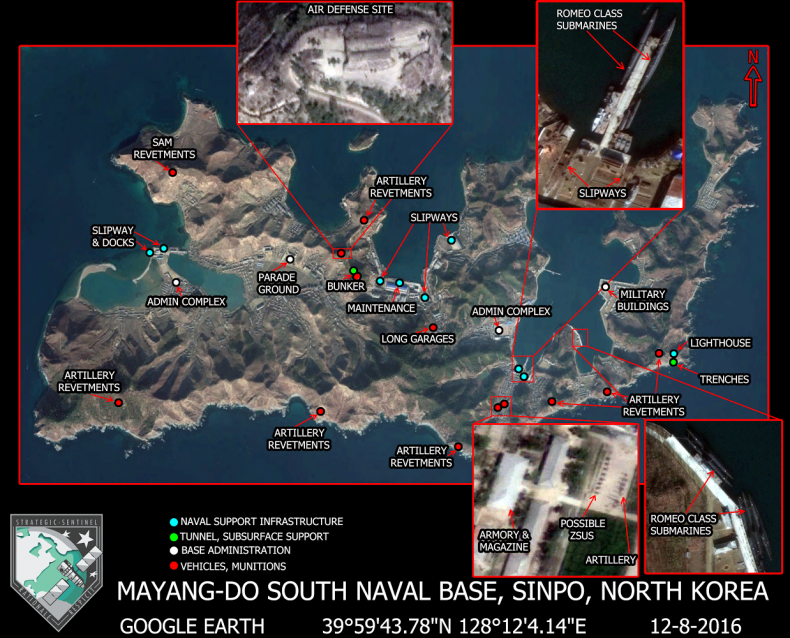
Source: Strategic Sentinel
Significance
Sinpo, a small city bordering the Sea of Japan, has been building North Korean submarines for decades. Sinpo’s shipyards churned out dozens of the aforementioned Shark-class submarines in the 1990s, and are now constructing more of the newest Gorae-class as well. (Nuclear missile submarines are generally larger than their conventional counterparts — Gorae, not incidentally, is Korean for “whale.”) As Joe Bermudez, a renowned expert on North Korean military matters, reported — twice — this particular vessel may very well undergo more testing and tweaking before more are built. In light of Sinpo’s history with the Shark-class, its current status as headquarters for the Gorae, and the overall prominence of submarines within the DPRK Navy, North Korea undoubtedly regards Sinpo as one of its most valuable shipbuilding sites.
Not content with the prospect of a mobile, surface-launched ICBM capability, North Korea is simultaneously — albeit much more slowly — working toward a sea-based nuclear deterrent. Crafting a reliable SLBM is a long, arduous process, full of tests, setbacks, and incremental improvement. Lamentably, however, North Korean ballistic missile development is progressing much faster than historical precedent would suggest, thanks in large part to newly unemployed Soviet scientists traveling to Pyongyang as the Cold War ended. Still, rigorous testing is necessary for new models to be considered remotely reliable, and the North has yet to come near this threshold in its SLBM program.
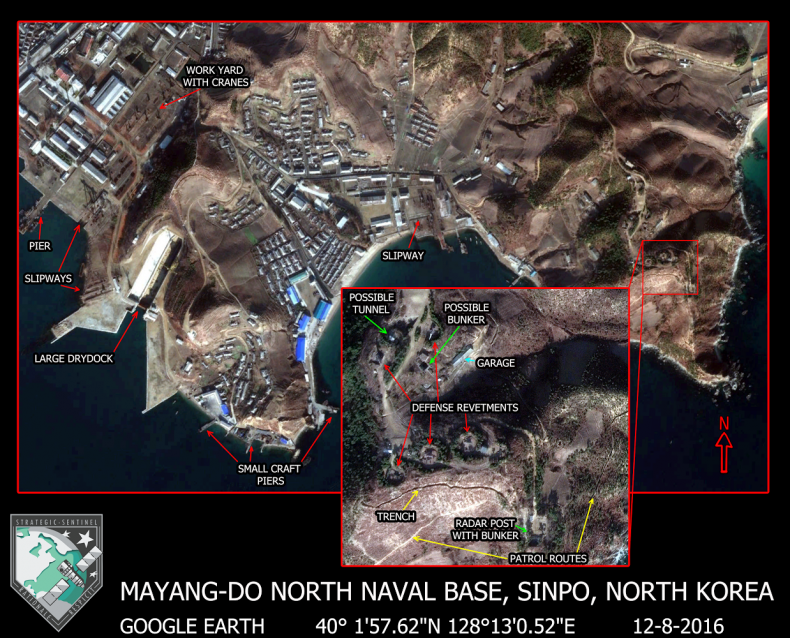
Source: Strategic Sentinel
A very poor test of an infant SLBM program could result in substantial damage to the submarine itself. To avoid any such potential and costly destruction, North Korea has constructed a land-based SLBM launch platform at Sinpo, barely a kilometer away from the Gorae’s submarine pen. We believe this to be the only such facility heretofore identified by open-source intelligence. Destroying it — and the Gorae next door — would deliver a crushing body blow to the North’s SLBM program.
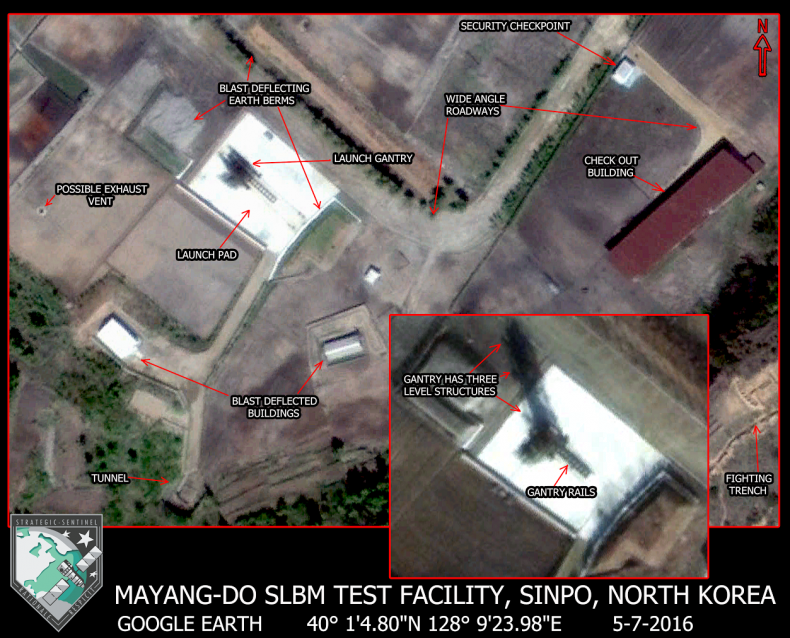
Source: Strategic Sentinel
Whether North Korea could realistically achieve a working long-range, nuclear SLBM by 2025 remains in serious doubt. Actually producing a functioning naval nuclear deterrent is several other matters entirely. The Gorae-class subs would need to be both quiet and capable of traveling the length of the Pacific Ocean to get into range of the United States, and both of these prospects seem a ways off. Once the vessel design is perfected, North Korea would need to produce at least six such submarines to maintain a continuous, credible deterrent. Then there’s the need for reliable command, control, and communications infrastructure, all of which would need to markedly improve on current conditions. North Korea remains rather far from a sea-based deterrent; one successful strike on Sinpo could set them back many more years.
Scanning a satellite photograph (dated December 2016) of Sinpo’s naval facilities and the Mayang-Do Naval Base not three kilometers off the coast, I personally counted over 25 docked submarines. Satellite imagery from March and May of that year do not reveal quite so many, but still well over a dozen are clearly visible. Most of these were the older, less capable Yono- and Romeo-class models. Still: the quantity of submarines facing simultaneous destruction is more than high enough to warrant attention; these smaller submarines can be used to traffic North Korean Special Ops into South Korean territory; the brand new Gorae lies within two kilometers of the other clustered submarines; and the research, testing, and naval support facilities add substantially to the base’s strategic value.
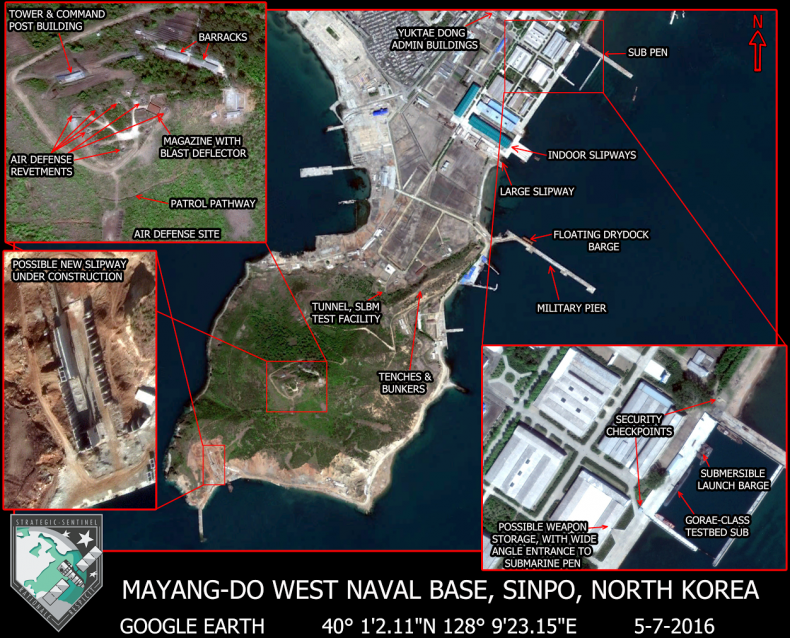
Source: Strategic Sentinel
Predictably, a surprise strike would be practically necessary to eliminate all of these assets in one fell swoop. The DPRK would be expected to disperse their submarines during times of heightened tension. (Note that the satellite images from March 2016 — taken during the annual U.S.-South Korea military exercises — show fewer submarines than in December.) A surprise strike could effectively cripple the North Korean East Sea Fleet; recall that submarines are the backbone of the DPRK Navy. Mayang-Do is one of but two east coast submarine bases, and Sinpo is the flagship of the North’s SLBM program.
Vulnerability
Rarely in military strategy do significance and vulnerability pair as smoothly together as they do at Sinpo and Mayang-Do. Generally, a base’s significance bestows upon it a certain vulnerability, for shrewd adversaries tend to strike their opponent’s center of gravity. This can then be ameliorated with physical fortifications, air defense networks, missile defense systems, secrecy, and so on. But truly, little in North Korea is “well defended” by modern military standards.
Sinpo and its related military facilities lie within close range of Toksan and Iwon air bases, both loaded with MiG-21 fighter aircraft. North Korea possesses several sophisticated or pseudo-sophisticated air defense systems, from the ancient SA-2 to the more modern KN-06. The KN-06 is very similar to the Russian S-300 and the Chinese HQ-9, the latter itself also being curiously similar to the S-300. This makes the KN-06 North Korea’s most advanced surface-to-air missile to date and the most plausible threat against American or allied aircraft. The KN-06 is still undergoing testing, however, and it is unclear how many batteries the North plans to produce.
As of right now, MiG-21s and S-200s look to be the most likely defenders of Sinpo and Mayang-Do. These platforms represent no real threat to the U.S., South Korean, or Japanese air forces. In Operation Desert Storm, American F-15s made quick work of Iraqi MiG-21s, 23s, 29s, and Su-25s. North Korea does not currently operate a single aircraft better than those the United States easily defeated over 25 years ago. Perhaps the North Korean Air Force or its SAMs would get lucky and destroy a few U.S. aircraft. Perhaps they get really lucky and slay a few more. Unless they can somehow shoot down most of the planes involved in a first strike — possibly including stealthy F-22s and B-2s or pseudo-stealthy F-35s — and intercept the cruise missiles fired from American and allied ships, the North Koreans would not be able to defend their base from utter destruction.
Conclusion
A strike on Sinpo and the island of Mayang-Do would be a tactician’s dream. One full salvo on the submarines stationed there (and their supportive infrastructure) could constitute the most brutally efficient military operation of the next Korean War. The risk-reward ratio dramatically favors the aggressor. Esteemed professionals — two former secretaries of defense, for example — have called for preventative strikes against North Korean military facilities. That is not what I am doing here. But should an aggressor choose to target Sinpo in such a wave, they could simultaneously cripple much of North Korea’s submarine force and slam its SLBM program to a halt.








